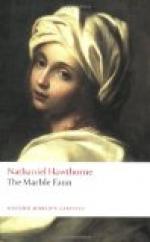In a great Parisian domicile, multifarious as its inhabitants might be, the concierge under the archway would be cognizant of all their incomings and issuings forth. But except in rare cases, the general entrance and main staircase of a Roman house are left as free as the street, of which they form a sort of by-lane. The sculptor, therefore, could hope to find information about Hilda’s movements only from casual observers.
On probing the knowledge of these people to the bottom, there was various testimony as to the period when the girl had last been seen. Some said that it was four days since there had been a trace of her; but an English lady, in the second piano of the palace, was rather of opinion that she had met her, the morning before, with a drawing-book in her hand. Having no acquaintance with the young person, she had taken little notice and might have been mistaken. A count, on the piano next above, was very certain that he had lifted his hat to Hilda, under the archway, two afternoons ago. An old woman, who had formerly tended the shrine, threw some light upon the matter, by testifying that the lamp required to be replenished once, at least, in three days, though its reservoir of oil was exceedingly capacious.
On the whole, though there was other evidence enough to create some perplexity, Kenyon could not satisfy himself that she had been visible since the afternoon of the third preceding day, when a fruit seller remembered her coming out of the arched passage, with a sealed packet in her hand. As nearly as he could ascertain, this was within an hour after Hilda had taken leave of the sculptor at his own studio, with the understanding that they were to meet at the Vatican the next day. Two nights, therefore, had intervened, during which the lost maiden was unaccounted for.
The door of Hilda’s apartments was still locked, as on the preceding night; but Kenyon sought out the wife of the person who sublet them, and prevailed on her to give him admittance by means of the duplicate key which the good woman had in her possession. On entering, the maidenly neatness and simple grace, recognizable in all the arrangements, made him visibly sensible that this was the daily haunt of a pure soul, in whom religion and the love of beauty were at one.
Thence, the sturdy Roman matron led the sculptor across a narrow passage, and threw open the door of a small chamber, on the threshold of which he reverently paused. Within, there was a bed, covered with white drapery, enclosed with snowy curtains like a tent, and of barely width enough for a slender figure to repose upon it. The sight of this cool, airy, and secluded bower caused the lover’s heart to stir as if enough of Hilda’s gentle dreams were lingering there to make him happy for a single instant. But then came the closer consciousness of her loss, bringing along with it a sharp sting of anguish.




